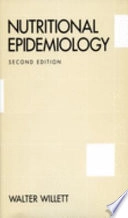This guide is intended for those who wish to understand the complex relationships between diet and the major diseases of western civilization, such as cancer and atherosclerosis. It is aimed both at researchers engaged in the unraveling of these complex associations and at readers of the rapidly multiplying and often confusing scholarly literature on the subject. The author starts with an overview of research strategies in nutritional epidemiology-a relatively new discipline which combines the knowledge compiled by nutritionists during this century with the methodology developed by epidemiologists to study the determinants of disease with multiple etiologies and long latent periods. A major part of the book is devoted to methods of dietary assessment using data on food intake, biochemical indicators of diet, and measures of body size and composition. The reproducibility and validity of each approach and the implications of measurement error are considered in detail. The analysis, presentation, and interpretation of data from epidemiologic studies of diet and disease are discussed.Particular attention is paid to the important influence of total energy intake on findings in such studies. As examples of methodologic issues in nutritional epidemiology, three substantive topics are examined in depth: the relations of diet and coronary heart disease, fat intake and breast cancer, and Vitamin A and lung cancer. This volume will benefit epidemiologists, nutritionists, dietitians, policy makers, public health practitioners, cancer researchers and oncologists, and cardiovascular specialists.
Åtkomstkoder och digitalt tilläggsmaterial garanteras inte med begagnade böcker





















